Related Research Articles

Halloween or Hallowe'en is a celebration observed in many countries on 31 October, the eve of the Western Christian feast of All Hallows' Day. It is at the beginning of the observance of Allhallowtide, the time in the liturgical year dedicated to remembering the dead, including saints (hallows), martyrs, and all the faithful departed. In popular culture, the day has become a celebration of horror, being associated with the macabre and supernatural.
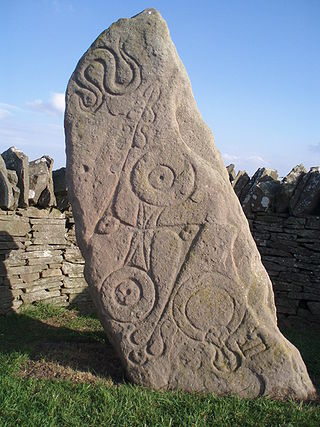
The Picts were a group of peoples who lived in Britain north of the Forth–Clyde isthmus in the Pre-Viking, Early Middle Ages. Where they lived and details of their culture can be inferred from early medieval texts and Pictish stones. The term Picti appears in written records as an exonym from the late third century AD, but was adopted as an endonym in the late seventh century during the Verturian hegemony. This lasted around 160 years until the succession of the Alpínid dynasty, when the Pictish kingdom merged with that of Dál Riata to form the Kingdom of Alba. The concept of "Pictish kingship" continued for a few decades until it was abandoned entirely as a contemporary signifier during the reign of Caustantín mac Áeda.
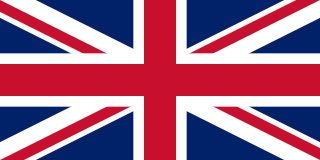
The United Kingdom of Great Britain and Ireland was a sovereign state in Northwestern Europe that was established by the union in 1801 of the Kingdom of Great Britain and the Kingdom of Ireland. The establishment of the Irish Free State in 1922 led to the remainder later being renamed the United Kingdom of Great Britain and Northern Ireland in 1927.

The Church of Ireland is a Christian church in Ireland, and an autonomous province of the Anglican Communion. It is organised on an all-Ireland basis and is the second-largest Christian church on the island after the Roman Catholic Church. Like other Anglican churches, it has retained elements of pre-Reformation practice, notably its episcopal polity, while rejecting the primacy of the pope.
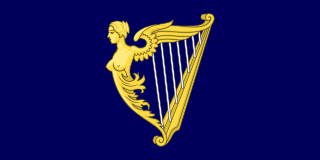
The Kingdom of Ireland was a monarchy on the island of Ireland that was a client state of England and then of Great Britain. It existed from 1542 until 1801. It was ruled by the monarchs of England and then of Great Britain, and was administered from Dublin Castle by a viceroy appointed by the English king: the Lord Deputy of Ireland. Aside from brief periods, the state was dominated by the Protestant English minority. The Protestant Church of Ireland was the state church. The Parliament of Ireland was composed of Anglo-Irish nobles. From 1661, the administration controlled an Irish army. Although styled a kingdom, for most of its history it was, de facto, an English dependency. This status was enshrined in Poynings' Law and in the Declaratory Act of 1719.
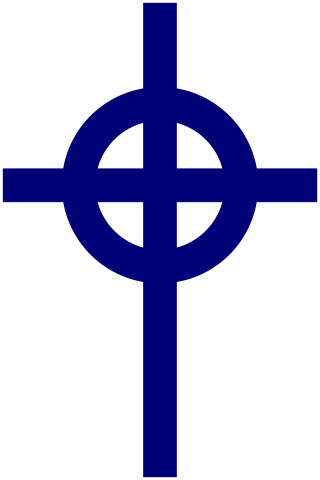
Irish Catholics are an ethnoreligious group native to Ireland whose members are both Catholic and Irish. They have a large diaspora, which includes over 36 million American citizens, plus over 7 million Irish Australians, of whom around 67% adhere to Catholicism.

Anti-Catholicism is hostility towards Catholics and opposition to the Catholic Church, its clergy, and its adherents. At various points after the Reformation, some majority Protestant states, including England, Northern Ireland, Prussia, Scotland, and the United States, turned anti-Catholicism, opposition to the authority of Catholic clergy (anti-clericalism), opposition to the authority of the pope (anti-papalism), mockery of Catholic rituals, and opposition to Catholic adherents into major political themes and policies of religious discrimination and religious persecution. Major examples of groups that have targeted Catholics in recent history include Ulster loyalists in Northern Ireland during the Troubles and the second Ku Klux Klan in the United States. The anti-Catholic sentiment which resulted from this trend frequently led to religious discrimination against Catholic communities and individuals and it occasionally led to the religious persecution of them. Historian John Wolffe identifies four types of anti-Catholicism: constitutional-national, theological, popular and socio-cultural.
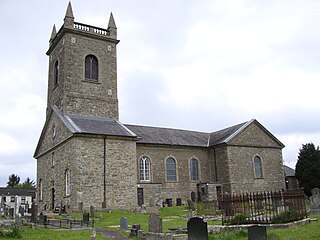
The Bishop of Clogher is an episcopal title which takes its name after the village of Clogher in County Tyrone, Northern Ireland. Following the Reformation, there are now parallel apostolic successions: one of the Church of Ireland and the other of the Roman Catholic Church.
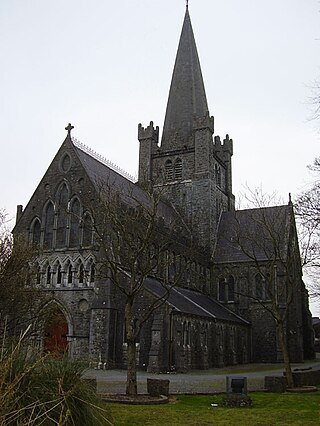
The Archbishop of Tuam is an archbishop which takes its name after the town of Tuam in County Galway, Ireland. The title was used by the Church of Ireland until 1839, and is still in use by the Catholic Church.

Saint Patrick was a fifth-century Romano-British Christian missionary and bishop in Ireland. Known as the "Apostle of Ireland", he is the primary patron saint of Ireland, the other patron saints being Brigid of Kildare and Columba. Patrick was never formally canonised, having lived before the current laws of the Catholic Church in these matters. Nevertheless, he is venerated as a saint in the Catholic Church, the Lutheran Church, the Church of Ireland, and in the Eastern Orthodox Church, where he is regarded as equal-to-the-apostles and Enlightener of Ireland.
Events from the year 1609 in Ireland.
Events from the year 1707 in Ireland.
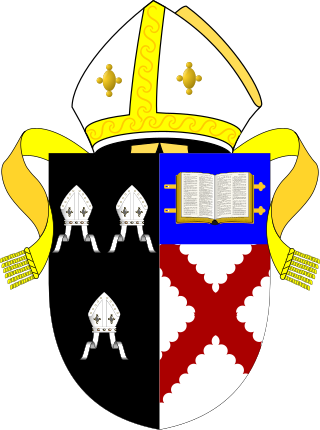
The United Dioceses of Meath and Kildare is a diocese in the Church of Ireland located in the Republic of Ireland. The diocese is in the ecclesiastical province of Dublin. Alone of English and Irish bishops who are not also archbishops, the Bishop of Meath and Kildare is styled "The Most Reverend".
Events from the year 1661 in Ireland.

The Archbishop of Armagh is an archiepiscopal title which takes its name from the city of Armagh in Northern Ireland. Since the Reformation, there have been parallel apostolic successions to the title: one in the Roman Catholic Church and the other in the Church of Ireland. The archbishop of each denomination also holds the title of Primate of All Ireland.
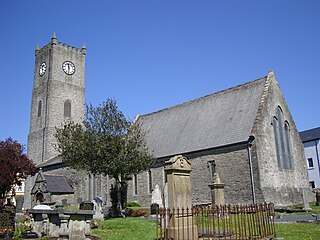
The Bishop of Raphoe is an episcopal title which takes its name after the town of Raphoe in County Donegal, Ireland. In the Roman Catholic Church it remains a separate title, but in the Church of Ireland it has been united with another bishopric.

British people or Britons, also known colloquially as Brits, are the citizens of the United Kingdom, the British Overseas Territories, and the Crown dependencies. British nationality law governs modern British citizenship and nationality, which can be acquired, for instance, by descent from British nationals. When used in a historical context, "British" or "Britons" can refer to the Ancient Britons, the Celtic-speaking inhabitants of Great Britain during the Iron Age, whose descendants forming the major part of the modern Welsh people, Cornish people, Bretons and considerable proportions of English people. It also refers to citizens of the former British Empire, who settled in the country prior to 1973, and hold neither UK citizenship nor nationality.

The Archbishop of Dublin is an archiepiscopal title which takes its name from Dublin, Ireland. Since the Reformation, there have been parallel apostolic successions to the title: one in the Catholic Church and the other in the Church of Ireland. The archbishop of each denomination also holds the title of Primate of Ireland.

The Bishop of Elphin is an episcopal title which takes its name after the village of Elphin, County Roscommon, Ireland. In the Roman Catholic Church it remains a separate title, but in the Church of Ireland it has been united with other bishoprics.

Irish Americans are ethnic Irish who live in the United States and are American citizens. Most Irish Americans today are descendants from immigrants who moved into America during the 19th century.
References
- ↑ "A New History of Ireland" Moody, T.W; Martin, F.X; Byrne, F.J;Cosgrove, A: Oxford, OUP, 1976 ISBN 0-19-821745-5
- ↑ "History of the Church of Ireland: From the revolution to the union of the Churches of England and Ireland, January 1, 1801" Mant, R: London, J.W. Parker, 1840
- ↑ "Handbook of British Chronology" By Fryde, E. B;. Greenway, D.E;Porter, S; Roy, I: Cambridge, CUP, 1996 ISBN 0-521-56350-X, 9780521563505
- ↑ "Fasti ecclesiæ hibernicæ: the succession of the prelates in Ireland" Cotton, H Dublin, Hodges & Smith, 1860